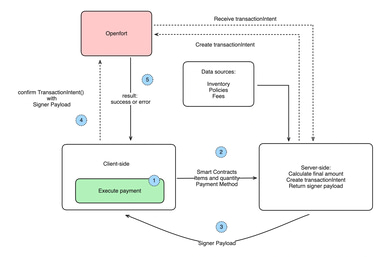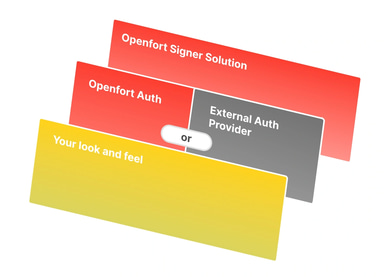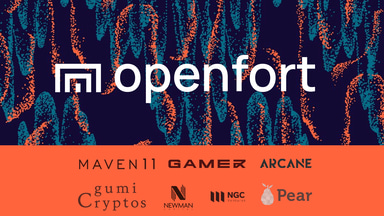Read
Edit
History
Notify
Share
Openfort
Openfort provides APIs for blockchain account interactions in gaming, including multi-chain accounts, gas sponsorship, and pop-upless blockchain interactions. It offers flexible ownership and simplifies player onboarding and monetization in web3 games.[1][2][3]
Overview
Established in September 2022 by siblings Joan and Jaume Alavedra, Openfort aims to provide a suite of APIs tailored to facilitate blockchain account interactions for gaming. It offers a wallet-as-a-service solution, supporting multi-chain accounts, gas sponsorship, and pop-upless blockchain interactions, alongside flexible ownership features.
With its first public beta launch in April 2023, Openfort streamlines onchain asset interactions, aiming to enable rapid game launches, scalable growth, and workflow automation. Developers can utilize Openfort to create API-based integrations, reducing engineering efforts while aiming to benefit from unified accounts and gas sponsorship. The platform integrates various technology standards, including gasless transactions and NFTs as smart wallets.
Openfort's inception was motivated by the Alavedra siblings' commitment to enhancing user experience in Web3 gaming, aiming to simplify complexities and foster accessibility and enjoyment for all players.[1][2][3][4][5][6]
“We, looking at the world of blockchain, realized its potential was shackled by numerous challenges. As passionate builders, we saw vast opportunity in the concept of account abstraction, and knew we could turn it into something game-changing.” - Joan and Jaume Alavedra [5]
API
The Openfort API is structured following REST principles, featuring predictable URLs, form-encoded request bodies, JSON responses, and standard HTTP codes, authentication methods, and verbs. It aims to provide both test and live modes, with the mode determined by the API key used for authentication. However, it does not support bulk updates, processing only one object per request.[7]
Products
Authentication
Openfort allows users to establish secure non-custodial embedded smart accounts linked to their selected login methods. Users can readily request signatures and transactions for on-chain interactions, with embedded smart accounts offering increased customization and security features. Integration options include utilizing Openfort as the authentication provider or integrating a third-party provider alongside existing stacks.
Openfort Authentication combines the Openfort Signer and Authentication Services, aiming to facilitate user onboarding and key pair generation. It supports web2 authentication methods like email/password and OAuth2.0 for social accounts (e.g., Google), seamlessly integrating into existing user interfaces or offering a pre-configured authentication solution.[8]
Embedded Signer
Openfort allows players to create secure, self-custodial embedded signers linked to their login method. These embedded signers enable easy request of signatures and transactions for on-chain interactions within the application. They offer customization for presenting prompts to users and eliminate the need for separate wallet clients. Users can have at most one embedded signer associated with their account.[9]
Accounts
Openfort's account infrastructure comprises two types: Smart Accounts, used by players and compliant with ERC-4337, and Dev Accounts, intended for developers and compliant with ERC-2771. Smart Accounts cater to player needs, while Dev Accounts offer additional features such as nonce and gas spike protection, assisting developers in managing the meta aspects of their games.[10]
Smart Accounts
Openfort offers smart accounts tailored for gaming, aiming to provide flexible key management solutions to enhance player experiences. Central to this is the concept of account abstraction, intended to deliver a Web3 experience similar to Web2 while ensuring security.
Users can create self-custody wallets supporting Web2 logins without needing seed phrases, and Openfort facilitates gas sponsorship and ERC20 gas payments. Transactions are streamlined through batching and automation, with wallet recovery mechanisms provided.
Openfort suggests creating a player upon user authentication, each assigned a unique playerId for identification and interaction within the gaming environment.[11]
DEV Accounts
DEV Accounts within Openfort are externally-owned accounts (EOAs) utilized internally to manage game flows and experiences. They are designed to be cost-effective compared to smart accounts, providing game developers with an efficient means to handle internal game mechanics.
These accounts can execute various game logic tasks, such as managing escrow for competitions or distributing minted assets to players after winning a competition. DEV Accounts serve multiple use cases, including minting assets, managing treasuries, and facilitating escrow services.[12]
Transaction Cloud
Openfort's transaction infrastructure aims to facilitate transactions across EVM-compatible chains without necessitating the management of private keys or hosting secure signing infrastructure. It aims to ensure the inclusion of valid transactions in blocks, regardless of reorganizations or gas spikes, supporting throughput of over 5,000 transaction requests per second.
In the context of Web3 gaming, transactions extend beyond financial activities to include in-game currency adjustments, item grants, and crafting. Transactions commence with a transaction intent, authenticated and dispatched to the Openfort API, containing sender and recipient addresses alongside transaction data. Openfort verifies and processes the transaction, furnishing a unique transaction hash for tracking purposes.
Transaction intents encompass various variables, including transaction data, enabling flexibility in refining transactions, supporting optimistic transactions, and defining interactions with smart contracts.[13][14]
Gas Sponsorship
Gas sponsorship in Openfort provides a flexible method for managing gas payments, particularly aimed at tailoring user experiences, especially concerning in-game items and currencies. Gas managers, defined by companies, determine how and when an application will sponsor a user's gas fees using Openfort's paymaster.
This enables customized user experiences, such as abstracting gas fees for new users to encourage game adoption, allowing users to pay gas fees using ERC20 tokens like USDC, and promoting in-game actions while having users pay for actions that take them out of the ecosystem.
Developers can specify gas policies for contracts and functions where users don't have to pay gas fees in native tokens. Gas sponsorship can be done by paying with fiat through balance credit or with native tokens by networking them through the Paymaster smart contract deployed by Openfort in supported chains.[15]
Funding
In May 2023, Openfort concluded a $3M seed funding round. The platform, focusing on streamlining crypto account management and enabling programmatic transactions through robust API endpoints, aims to assist game developers in seamlessly connecting players to web3 opportunities.
Among the investors contributing to this funding are gCC, M11, PearVC, Game7, Newman Capital, Arcane, NGC, Alex Masmej, Cristian Manea, and others.[5][16]
Openfort
Commit Info
Edited By
Edited On
May 13, 2024
Feedback
Average Rating
How was your experience?
Give this wiki a quick rating to let us know!
Twitter Timeline
Loading
Media






REFERENCES
[1]
[2]
[3]
[4]
[5]
[6]
[7]
[8]
[9]
[10]
[11]
[12]
[13]
[14]
[15]
[16]


